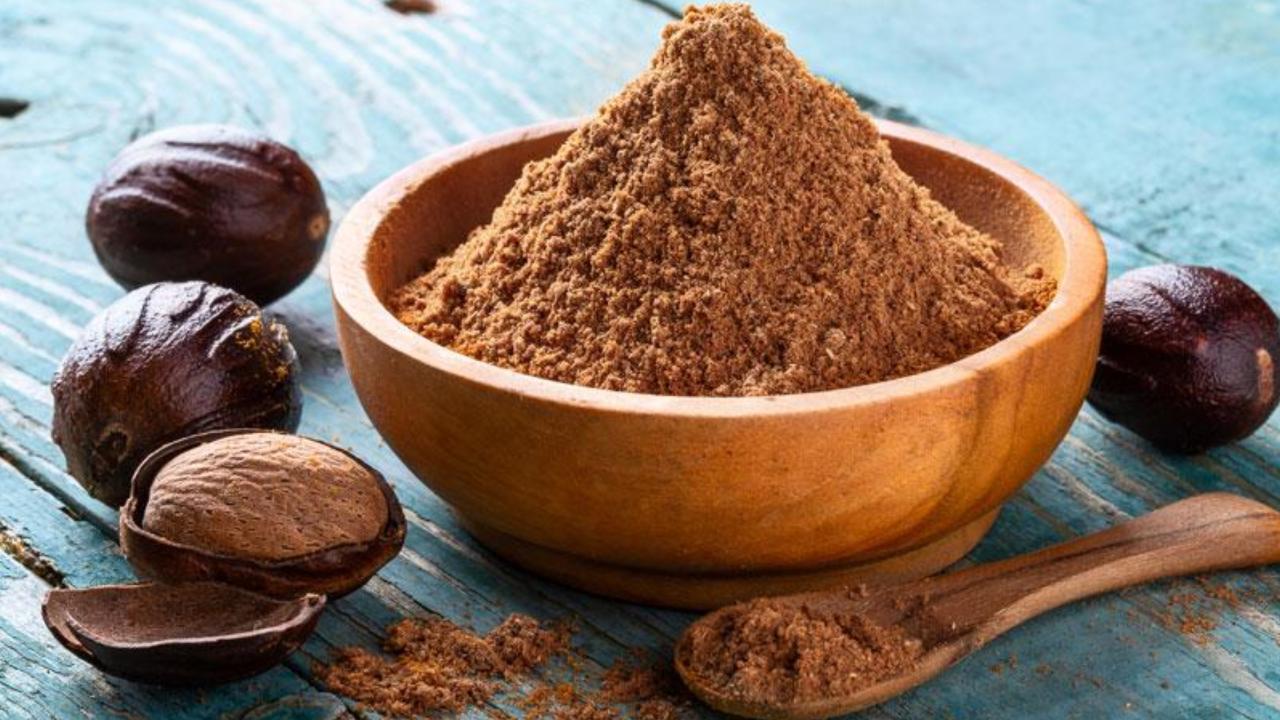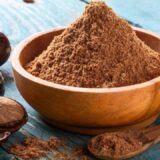Top 10 Health Benefits of Nutmeg (Jaiphal) in Ayurveda
Nutmeg, also known as Jaiphal, is a fragrant spice derived from the seed of the Myristica fragrans tree, widely cherished for its unique flavor and impressive health benefits. What makes this spice even more fascinating is that it yields two valuable products—nutmeg itself and its lacy red covering is known as mace or Javitri.
While both are used to enhance the taste and aroma of various dishes, they are also highly regarded in traditional medicine, particularly in Ayurveda. Nutmeg is known to help ease anxiety and depression due to its natural calming properties, and it also supports digestion, making it a beneficial addition to everyday meals.
Traditionally, it has been used to relieve gas and diarrhea in infants and reduce inflammation and joint pain in adults. Beyond its medicinal uses, nutmeg butter is valued in the cosmetic industry, and nutmeg powder is used in skincare routines to treat pigmentation and oily skin.
Morphology of Nutmeg (Jaiphal)
Nutmeg, botanically known as Myristica fragrans, is a tropical evergreen tree native to the Banda Islands of Indonesia. The part used as a spice and in Ayurvedic medicine comes from its seeds.
- Tree: A medium-sized evergreen tree that can grow up to 10–20 meters in height. It has dense foliage and a spreading canopy.
- Leaves: Simple, alternate, and elliptic with a glossy surface. They are dark green above and paler beneath.
- Flowers: Small, pale yellow, and fragrant. Nutmeg trees are dioecious, meaning male and female flowers grow on separate trees.
- Fruit: The fruit resembles an apricot and splits open when ripe.
- Seed (Nutmeg): Inside the fruit is a hard seed, which is the actual nutmeg. It’s oval, brown, and wrinkled, about 2–3 cm long.
- Aril (Mace): Surrounding the seed is a red, lacy covering called the aril, which is dried and sold separately as mace — another valuable spice.
Medicinal Properties of (Nutmeg)
Rasa (Taste)
- Tikta – Bitter
- Katu – Pungent
Guna (Qualities)
- Laghu – Light (easy to digest)
- Teekshna – Piercing, sharp, strong, and penetrative
Vipaka (Post-digestive Effect)
- Katu – Converts to a pungent taste after digestion
Veerya (Potency)
- Ushna – Hot potency (increases internal heat, stimulating)
Effect on Tridosha
- Balances Kapha and Vata
(Can slightly aggravate Pitta due to its heating and sharp nature)
Nutmeg in Different Indian Languages
- English Name: Nutmeg
- Hindi Name: Jaiphal (जायफल)
- Urdu Name: Jauzbuwa (جوزبوا), Jaiphal (جائفل)
- Telugu Name: Jaji Kaya (జాజి కాయ)
- Tamil Name: Jatikkai (ஜதிக்காய்), Sathiccupi, Jadhikai, Jadhiccupi
- Bengali Name: Jaiphal (জায়ফল), Javitri (জাবিত্রী) (Note: Javitri actually refers to Mace, the outer covering of nutmeg seed)
- Kannada Name: Jaikai (ಜಾಯಿಕಾಯಿ)
- Malayalam Name: Jathika (ജാതിക്ക)
- Marathi Name: Jaiphal (जायफळ)
- Gujarati Name: Jaiphal (જાયફળ)
Sanskrit Synonyms for Nutmeg (Jaiphal)
Sanskrit synonyms for nutmeg (jaiphal) with their meanings in English
- Jatiphala – “Fragrant fruit” (Jati = jasmine/fragrance, Phala = fruit)
- Malatiphala / Malatisuta – “Fruit or offspring of jasmine” (symbolic of fragrance)
- Soumansayani – “That which brings pleasantness or cheerfulness”
- Majjasaram – “Essence of the seed/kernel” (the core part is the most valuable)
- Sugandha – “Aromatic” or “fragrant”
- Shalooka – A poetic term, possibly referring to the form or appearance of the fruit
- Puta – “Encased” or “shelled” (describes the shell-like nature of nutmeg)
- Madashounda – “Used after consuming alcohol” (traditionally used to balance or complement intoxicants)
The Varieties of Nutmeg
- Myristica fragrans: This is the true Nutmeg species most commonly used for culinary and medicinal purposes. It is the main variety from which the nutmeg spice is derived.
- Myristica malabarica: This is often used as an adulterant in the market and is commonly referred to as Bombay Nutmeg. It is considered of lower quality compared to Myristica fragrans but still has similar uses in some regions.
- Myristica dactyloides (also known as M. Laurifolia Hook f. & Thoms): This species is occasionally used as an alternative to Nutmeg and can be referred to as Jaiphal in some regions. It is less commonly used than the other varieties but still finds its place in certain localities.
Nutmeg (Jaiphal) Benefits in Ayurveda
Nutmeg has various therapeutic properties, including water-absorbing, drying, and sputum-absorbing qualities, making it useful for treating several conditions. Below are its key benefits:
- Laghu: Light to digest, making it easy on the stomach, especially when consumed in moderate amounts.
- Trushnapaha: Relieves excess thirst, which is particularly useful in cases of dehydration or after intense physical activity.
- Vaktra Kledahara: Reduces excessive moisture and sliminess in the mouth, promoting a fresher breath and improved oral hygiene.
- Vaktra Daurgandhyahara: Helps relieve bad breath, making it a popular remedy in oral health practices.
- Artijit: Useful in treating throat pain, providing soothing relief for sore throats or inflammation.
- Vata Atisara: Relieves diarrhea, especially when associated with bloating and abdominal pain, by acting as a natural bowel regulator.
- Mehaghna: Helpful for diabetes and urinary tract infections, as it can regulate blood sugar levels and support urinary health.
- Vrushya: Acts as an aphrodisiac, enhancing sexual health and improving libido, which is beneficial for reproductive health.
- Deepana: Improves digestive strength and promotes better digestion, stimulating appetite and nutrient absorption.
- Hrudya: Acts as a cardiac tonic, benefiting heart health by supporting circulation and reducing stress on the heart.
- Rochana, Ruchikrut: Improves taste and acts as an appetizer, increasing appetite and promoting better food intake.
- Teekshna: Piercing, strong, and effective in treating conditions related to excess moisture, clearing congestion in the body.
- Grahi: Absorbent and helpful for IBS, diarrhea, and bowel binding, helping to firm up stools and relieve digestive discomfort.
- Krumihara: Useful in treating intestinal worm infestations and infected wounds, acting as a natural antiseptic and parasite deterrent.
- Kasahara: Relieves cough and cold, offering a natural remedy for respiratory discomfort and throat irritation.
- Vamihara: Relieves nausea and vomiting, providing relief from stomach upsets and helping to balance the digestive system.
- Shwasahara: Effective in treating asthma, COPD, and other respiratory issues, acting as a bronchodilator and reducing inflammation.
- Trushnahara: Reduces excessive thirst, particularly useful for cooling down the body and hydrating after illness or hot weather.
- Shoshahara: Helps relieve emaciation and dehydration, promoting overall hydration and tissue nourishment.
- Peenasahara: Relieves allergic rhinitis, reducing symptoms of nasal congestion, sneezing, and watery eyes.
- Hrudruja: Eases cardiac pain, providing comfort in cases of chest discomfort or mild heart-related symptoms.
- Varnakrut: Improves skin tone and complexion, contributing to a clearer, more radiant skin appearance.
- Vishapaha: Acts as a natural detoxifier and anti-toxic agent, helping the body eliminate harmful substances and toxins.
- Sleep Inducer: Nutmeg can aid in inducing sleep by promoting relaxation and reducing stress before bedtime.
- Low Sperm Count Treatment: Useful for treating low sperm count (Oligospermia), improving male reproductive health and vitality.
Additional Uses:
- Singing Voice Improvement: Nutmeg is used in throat disorders and can help improve the quality of the voice by clearing excess sputum, thus enhancing vocal clarity.
- Ayurvedic Betel Chewing: Nutmeg is an essential ingredient in Tambula Pan (an Ayurvedic betel chewing preparation), which is believed to have digestive and stimulating properties.
- Headache and Joint Pain Relief: A paste of nutmeg is applied to the forehead to relieve headaches and to painful joints for pain relief, acting as a natural analgesic.
Nutmeg (Jaiphal) Medicinal Properties in Ayurveda
Jatipatri is the rind or skin of the nutmeg fruit and has several medicinal properties. Below are its key benefits:
- Katutiktha: It has a pungent and bitter taste, which stimulates the digestive system.
- Surabhi: Fragrant in nature, contributing to its pleasant aroma and therapeutic effects.
- Kaphanashini: Alleviates kapha (one of the three doshas), making it beneficial for conditions like congestion, excess mucus, and lethargy.
- Hrudya: Acts as a cardiac tonic, promoting heart health by strengthening heart functions and circulation.
- Vatakaphapaha: Balances Vata and Kapha dosha, helping to restore harmony in the body and prevent imbalances related to these doshas.
- Ruchikrut: Improves taste and acts as an appetizer, useful for treating anorexia or lack of appetite by stimulating hunger.
- Varnakrut: Improves skin tone and complexion, contributing to healthy, glowing skin.
Other Uses:
- Cough and Asthma: Helpful in relieving cough, asthma, and related respiratory conditions by clearing excess mucus.
- Intestinal Worm Infestation: Beneficial for treating intestinal worms, acting as a natural anti-parasitic.
- Oral Cleanliness: Promotes cleanliness of the mouth, helping freshen breath and support oral health.
- Jadya Treatment: It is useful in treating jadya (a condition associated with sluggishness or heaviness in the body).
Nutmeg Oil Benefits (Jaiphal Taila)
Nutmeg Essential Oil (Jaiphal Taila) and its medicinal uses: Nutmeg essential oil, extracted from the seed of Jaiphal (Nutmeg), is known for its wide range of therapeutic properties in both internal and external applications:
- Samuttejana: Acts as a stimulant, energizing the body and mind, and helping to reduce fatigue.
- Agnida: Functions as a carminative, improving digestive strength and relieving indigestion or sluggish digestion.
- Jeerna Atisara: Useful in treating chronic diarrhea and dysentery, especially when associated with poor digestion.
- Adhmanahara: Relieves bloating and abdominal distension by dispersing trapped gas and promoting smooth digestion.
- Akshepa: Beneficial in managing convulsions and epilepsy, with its calming and nerve-soothing effects.
- Artinut, Shulanut: Effectively relieves pain and abdominal colic, acting as a natural analgesic and antispasmodic.
- Amavatahara: Useful in treating rheumatoid arthritis (Amavata) by reducing inflammation and joint stiffness.
- Balya: Enhances strength and immunity, revitalizing the body and improving physical endurance.
- Dantavrana: Provides relief from toothache, and is often used in dental care remedies.
- Vrananut: Promotes wound healing, helping to disinfect and speed up tissue repair.
Special Application: The oil is also traditionally applied externally over the penis as a remedy for erectile dysfunction, believed to enhance local circulation and vitality.
Top 10 Benefits of Nutmeg (Jaiphal)
Nutmeg, known as ‘Jaiphal’ in Ayurveda, has been valued for centuries in Ayurvedic medicine for its potential health benefits. Here are some of the ways nutmeg is used in Ayurveda
1. Improves Digestion
Nutmeg stimulates digestive enzymes, enhances appetite, and helps relieve indigestion, bloating, gas, and abdominal pain. It acts as a Deepana (digestive stimulant) and Pachana (digestant) in Ayurvedic medicine.
2. Relieves Insomnia
Nutmeg is well-known for promoting deep, natural sleep. When taken with warm milk or ghee at bedtime, it calms the mind, reduces restlessness, and works as a mild natural sedative without causing dependency.
3. Natural Pain Reliever
With its analgesic and anti-inflammatory qualities, nutmeg helps reduce headaches, menstrual cramps, joint pain, and toothaches. It can also be applied externally for muscle pain and arthritis relief.
4. Treats Diarrhea and IBS
Thanks to its Grahi (absorbent) nature, nutmeg firms up stools, reduces abdominal bloating and discomfort and is especially helpful in managing IBS, chronic diarrhea, and post-infectious dysentery.
5. Supports Respiratory Health
Nutmeg clears mucus from the lungs and sinuses, making it effective in asthma, bronchitis, chronic cough, and allergic rhinitis. It works as a Kapha-pacifying expectorant and supports easy breathing.
6. Boosts Brain Function
Acting as a nervine tonic, nutmeg supports mental clarity, reduces fatigue and stress, and helps in mild cases of depression. In very small doses, it is traditionally used to support epilepsy and nervous disorders.
7. Aphrodisiac Effects
Nutmeg boosts sexual desire, improves stamina, and supports hormonal balance. It’s used in Ayurveda to manage Oligospermia (low sperm count) and erectile dysfunction, enhancing overall reproductive vitality.
8. Enhances Skin Complexion
It helps brighten the skin, reduce acne, and clear blemishes. With its antibacterial and anti-inflammatory properties, nutmeg is commonly used in face packs for achieving healthy, glowing skin.
9. Detoxifies the Body
Nutmeg acts as a Vishapaha (anti-toxic agent) that helps cleanse the liver, eliminate toxins (Ama), and support metabolism. It is useful for mild food poisoning and digestive toxicity.
10. Oral and Dental Health
Nutmeg addresses bad breath, reduces excess salivation, and fights oral infections. It also relieves toothaches and strengthens gums, and is found in herbal mouthwashes and traditional tooth powders.
Systemic Action of Nutmeg (Jaiphal)
1. External Use
Nutmeg leaves have analgesic, anti-inflammatory, stimulant, and antimicrobial properties. They help alleviate headaches, joint inflammation, and treat skin diseases. Nutmeg oil is useful for erectile dysfunction and can be applied externally for pain. It also helps in chronic wounds and rhinitis.
2. Nervous System
Nutmeg is beneficial for disorders caused by vitiated Vata dosha, such as epilepsy, insomnia, and tremors. It helps reduce pain and nervous system imbalances. However, overdose can cause intoxication. It must be used in moderation to avoid any adverse effects.
3. Digestive System
Nutmeg acts as a digestive stimulant, carminative, and liver tonic. It aids in diarrhea, loss of appetite, malabsorption syndrome, and liver disorders. Nutmeg water helps treat enteric fever, vomiting, and weakness. The powder applied on the umbilical area helps in diarrhea relief.
4. Circulatory System
Nutmeg works as a cardiac stimulant, enhancing heart function and improving blood circulation. Its properties support overall circulatory health and help maintain proper blood flow, which can boost heart performance and reduce circulatory issues, contributing to a healthy cardiovascular system.
5. Respiratory System
Nutmeg helps in the expulsion of excessive Kapha dosha from the body, making it effective in treating cough, hiccough, and other respiratory conditions. It relieves congestion, supports the lungs, and promotes easy breathing, helping alleviate symptoms of chronic respiratory diseases.
6. Reproductive System
Nutmeg is a natural aphrodisiac, enhancing sexual desire and preventing premature ejaculation. It is beneficial for dysmenorrhea (painful menstruation) and improving reproductive health. Regular use in small doses supports hormonal balance and improves vitality, making it a popular herb in sexual health treatments.
7. Tapakrama (Antipyretic)
Nutmeg exhibits antipyretic properties, helping reduce fever, especially those associated with digestive issues. It regulates body temperature and aids in fever management, providing relief from the discomfort caused by high body temperatures while promoting recovery in conditions like foodborne illness or gastrointestinal fever.
8. Satmikarana
Nutmeg is beneficial for restoring strength and vitality after diarrhea or malabsorption conditions. It helps recover energy lost during these conditions, replenishing essential nutrients and improving overall health. Regular use supports bodily rejuvenation, assisting in post-illness recovery for weakened individuals.
Parts Used:
- Seed: The primary part used for its medicinal properties, providing the characteristic flavor and benefits.
- Seed Coat: The outer covering of the seed, which contains active compounds.
- Oil: Nutmeg oil is extracted from the seed and is used for its therapeutic effects, including in aromatherapy.
Dosage:
- Curna (Powder): 250 mg to 1 gram in divided doses per day, typically recommended for digestive and pain-relieving benefits.
- Taila (Oil): 7 to 15 drops, often used topically or in aromatherapy for its soothing and anti-inflammatory properties.
How to Take Nutmeg (Jaiphal)?
Special care is essential, as nutmeg is potent and must be used in the correct dosage.
- For an adult, the recommended daily dose of nutmeg is 50–70 mg.
- For Ashwagandha, the usual dose is 1–3 grams, taken once or twice a day.
Preparation Method:
- Mix 100 grams of Ashwagandha powder with 2 grams of nutmeg powder thoroughly.
- From this mix, take 1–2 grams at night.
- Consume this for a period of 2–3 weeks, or as directed by your Ayurvedic doctor.
- Mix the powder with half a teaspoon of ghee, and swallow with lukewarm water.
Why Ghee?
Both nutmeg and ashwagandha are hot in potency, which may aggravate Pitta dosha in some individuals, leading to stomach discomfort. Ghee helps balance Pitta, ensuring better tolerance and absorption.
Why Lukewarm Water?
Lukewarm water aids in the digestion of ghee or oil-based preparations, improving assimilation and reducing digestive strain.
This method is traditionally used for calming the nervous system, improving sleep, and enhancing strength and immunity. Let me know if you’d like this in a more visual or infographic format!
Ayurvedic Medicines with Nutmeg (Jaiphal)
1. Jatiphaladi Churna
Uses: Treats digestive and respiratory conditions, such as indigestion, cough, and cold. Nutmeg helps in balancing Vata and Kapha and adds carminative and expectorant properties.
2. Dadimavaleha
Uses: Effective in relieving diarrhea and dysentery. Nutmeg supports its Grahi (absorbent) and digestive actions.
3. Nasika Churna
Uses: Used for chronic rhinitis, headaches, and bad breath. Nutmeg provides anti-inflammatory and aromatic benefits that clear nasal passages and freshen the breath.
4. Mrita Sanjivani Gulika
Uses: Used in the treatment of high-grade fevers, epilepsy, and late-stage fevers. Nutmeg’s stimulant and nervine properties make it helpful in reviving consciousness and calming the nervous system.
Precautions & Side Effects of Nutmeg (Jaiphal)
Nutmeg is a powerful Ayurvedic spice, but like many natural remedies, it must be used responsibly. Overuse or incorrect usage can lead to unwanted effects. Here’s what you need to know:
Precautions When Using Nutmeg:
- Use in Moderation: Nutmeg is potent. Limit intake to no more than 1/4 to 1/2 teaspoon per day for general wellness. Large doses (over 2 teaspoons) can be toxic.
- Avoid During Pregnancy: Nutmeg may stimulate uterine contractions and pose a risk of miscarriage or complications. It’s best avoided during pregnancy.
- Not Recommended While Breastfeeding
The effects of nutmeg on nursing infants are unknown. Until more is known, it’s safest to avoid use during breastfeeding. - Allergy Risk: Individuals allergic to tree nuts or spices should use caution. Nutmeg isn’t technically a nut, but allergic reactions can still occur.
- Buy High-Quality Nutmeg: Choose pure, organic, or Ayurvedic-grade nutmeg to avoid additives, mold, or chemical contamination.
- Consult a Healthcare Professional: Always seek advice from a qualified practitioner before using nutmeg medicinally, especially if you have existing health conditions or are on medication.
Potential Side Effects of Nutmeg (Jaiphal):
- Hallucinations & Disorientation: High doses can cause psychoactive effects, including hallucinations, dizziness, confusion, and paranoia — sometimes referred to as “nutmeg intoxication.”
- Nausea & Vomiting: Overconsumption can irritate the stomach and lead to nausea, vomiting, or diarrhea.
- Increased Heart Rate: Excessive use may stimulate the heart and lead to palpitations or increased heart rate.
- Dry Mouth & Flushed Skin: Some individuals report symptoms similar to dehydration or overheating after large doses.
- Liver Toxicity (in extreme cases): Chronic or excessive consumption may harm the liver over time.
FAQs
1. What is nutmeg best used for?
Nutmeg is best known for its calming, digestive, and sleep-inducing properties. In Ayurveda, it’s used to balance the doshas, especially when dealing with insomnia, indigestion, or anxiety.
2. Is nutmeg good for Vata dosha?
Yes! Nutmeg is particularly beneficial for pacifying Vata dosha due to its warming, grounding, and slightly sedative qualities. It helps soothe the nervous system and supports better sleep.
3. Can I drink nutmeg every day?
In small amounts, yes — but moderation is key. A pinch of nutmeg in warm milk or tea can be beneficial. Overconsumption can lead to toxicity or unwanted side effects.
4. Is nutmeg hot or cold in nature?
Nutmeg is considered hot (ushna) in nature according to Ayurveda. It generates warmth in the body and helps balance cold-related imbalances, especially those linked with Vata and Kapha.
5. Do nutmeg and turmeric go together?
Yes, nutmeg and turmeric can be a powerful combo! Both have anti-inflammatory properties and work well in golden milk or herbal teas for immunity and relaxation.
6. Is nutmeg a pain killer?
Nutmeg has natural analgesic (pain-relieving) properties. It’s often used in Ayurvedic oils and balms for joint pain, muscle soreness, and headaches.
7. How to use nutmeg for sleep?
Mix a pinch of nutmeg powder in warm milk before bedtime. It calms the nervous system, induces relaxation, and promotes restful sleep.
8. How to drink nutmeg tea?
Boil a cup of water or milk with a pinch of nutmeg, a bit of honey, and optionally some cinnamon or cardamom. Sip it warm to aid digestion and sleep.
9. How to use nutmeg for high blood pressure?
Nutmeg may support blood pressure management due to its calming effect on the nervous system. Add a small amount to herbal teas, but consult your doctor if you’re on medication.
10. Is nutmeg good in coffee?
Absolutely! A dash of nutmeg adds a warm, spicy flavor to coffee and may help reduce its jittery effects thanks to nutmeg’s calming nature.
11. Is nutmeg good for diabetes?
Preliminary research and Ayurvedic texts suggest nutmeg may help manage blood sugar levels, but it should be used sparingly and under guidance for diabetic care.
12. How to use nutmeg for cold and cough?
You can add a pinch of nutmeg powder to warm milk with honey or make a herbal decoction. Its warming properties help clear congestion and soothe the throat.

























